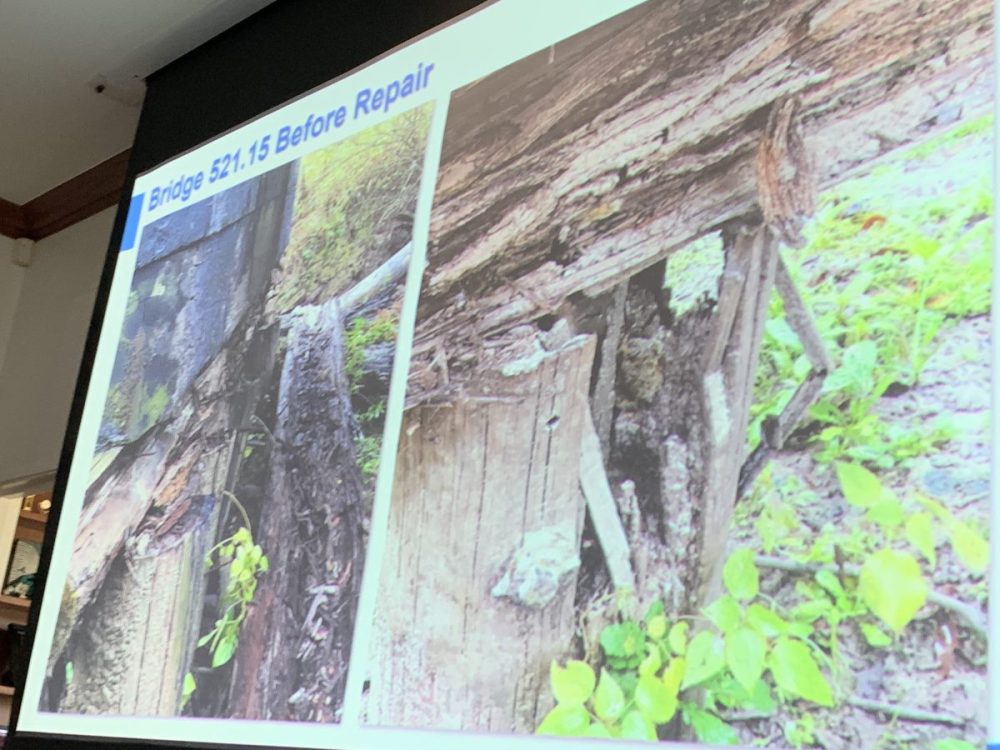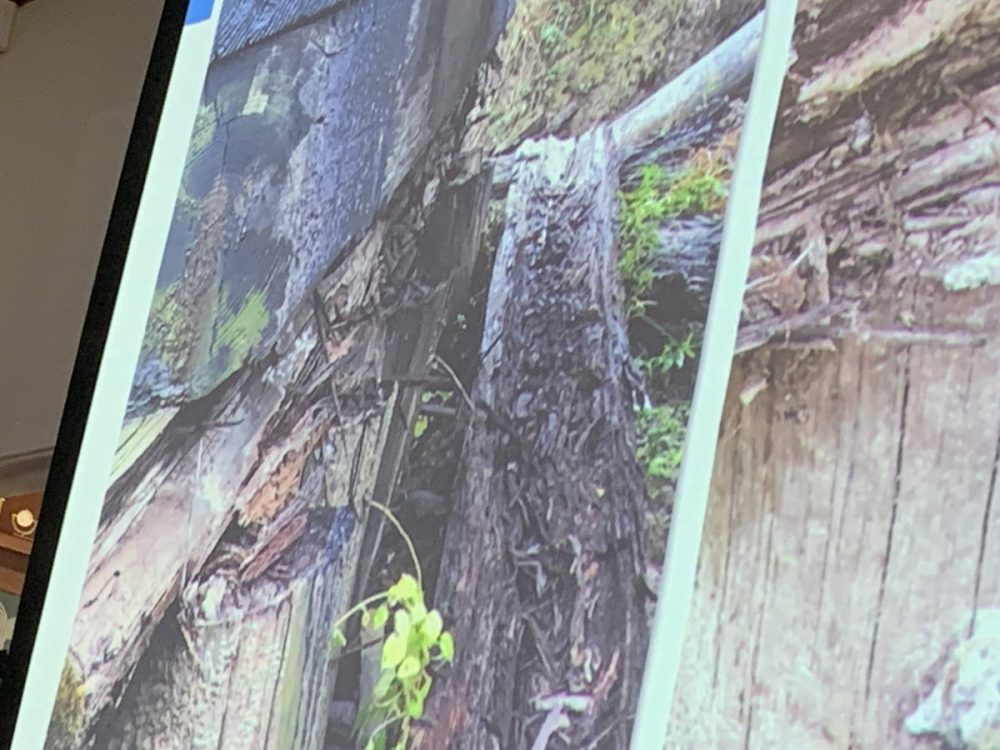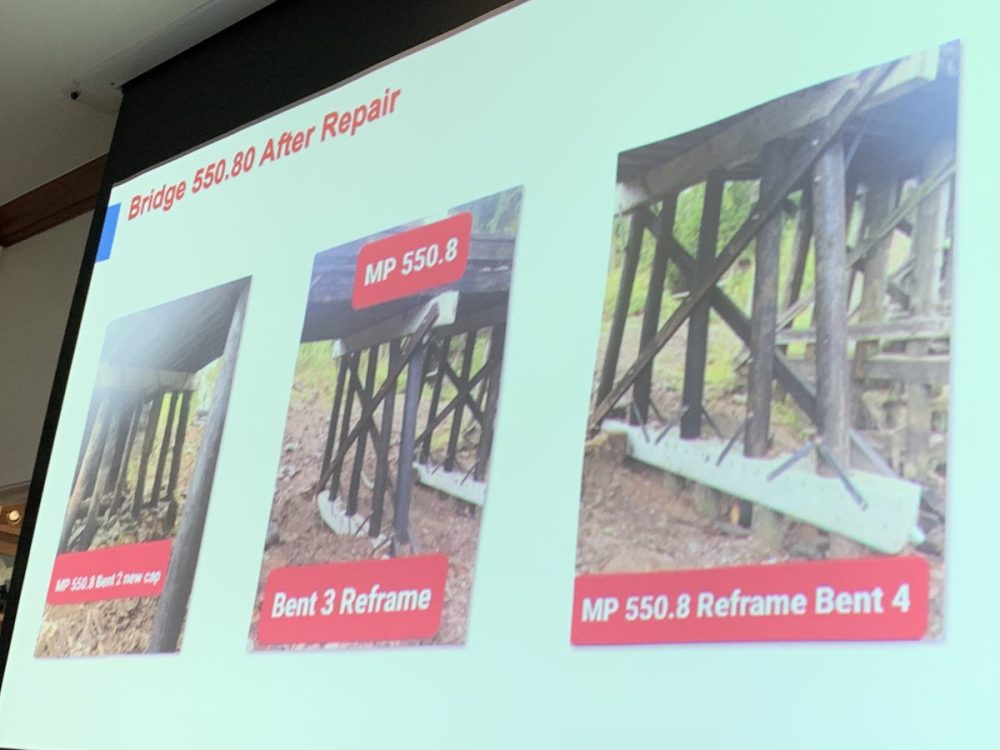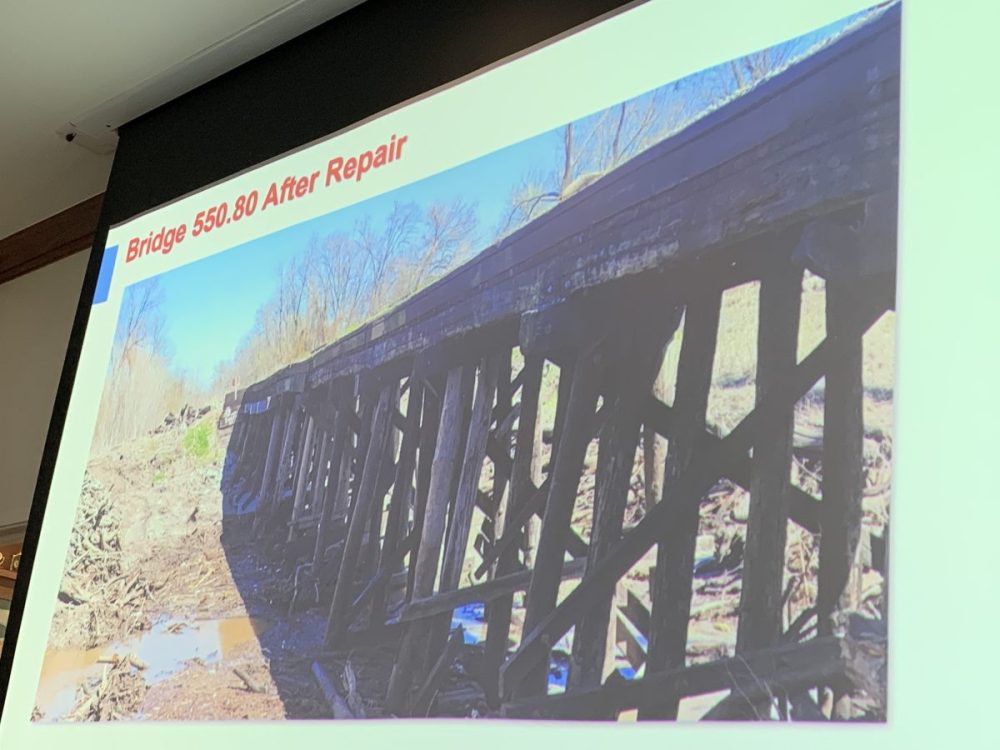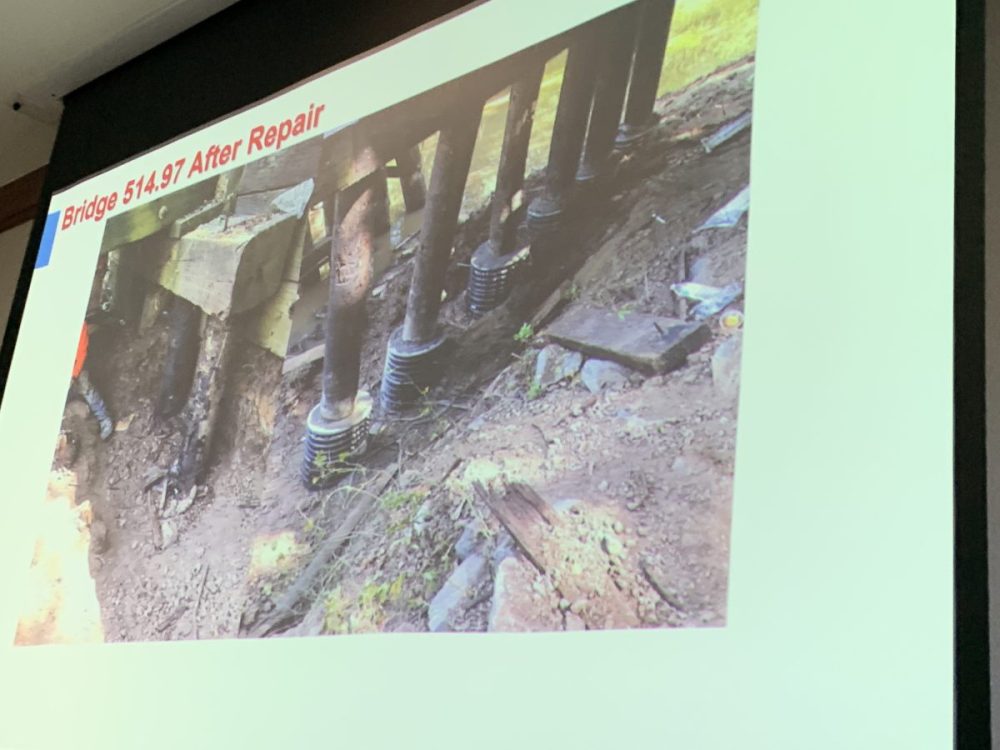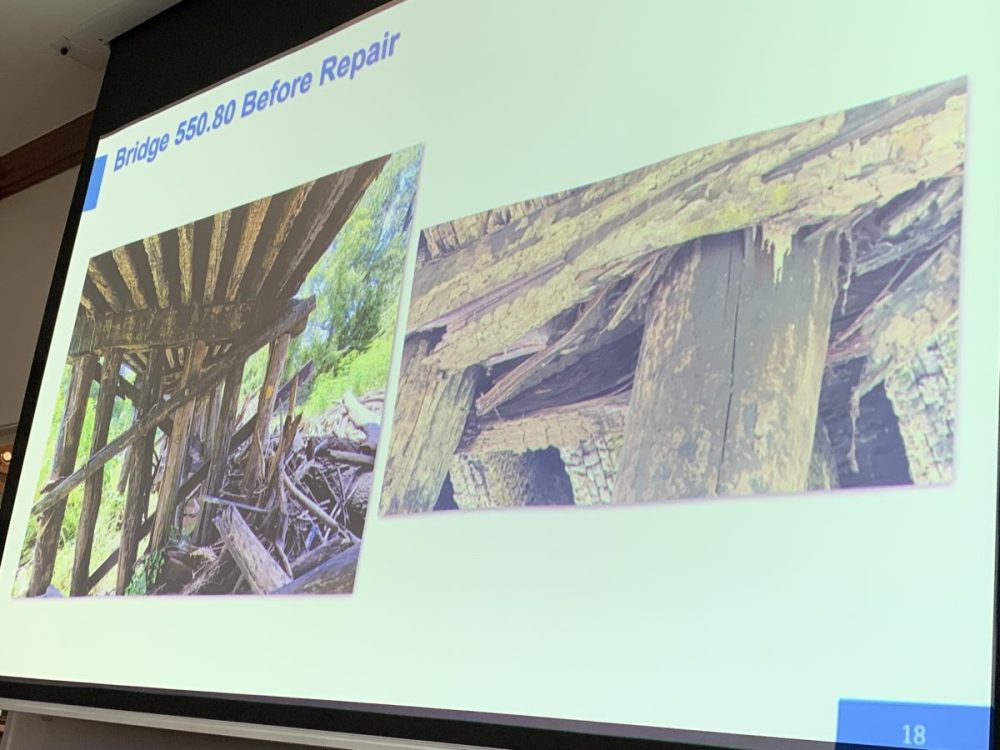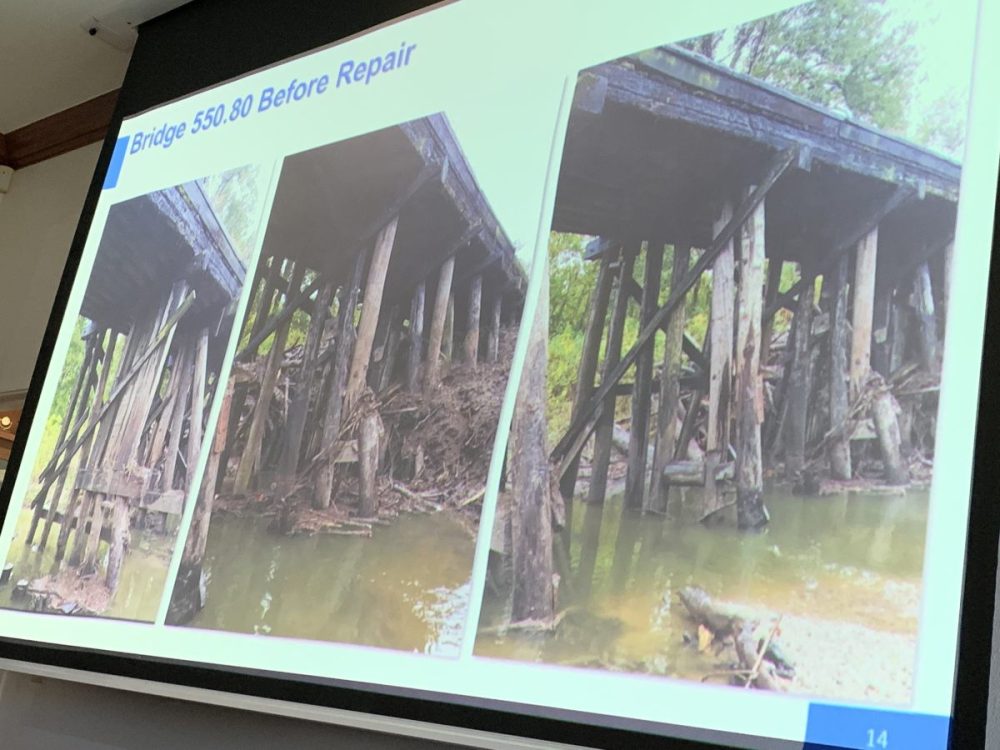Northeast Texas Rail Transportation District Board of Directors (known as NETEX Board) agreed to commit up to $550,000 toward track and bridge improvement projects along the rail to improve safety for operators and provide better service for customers.
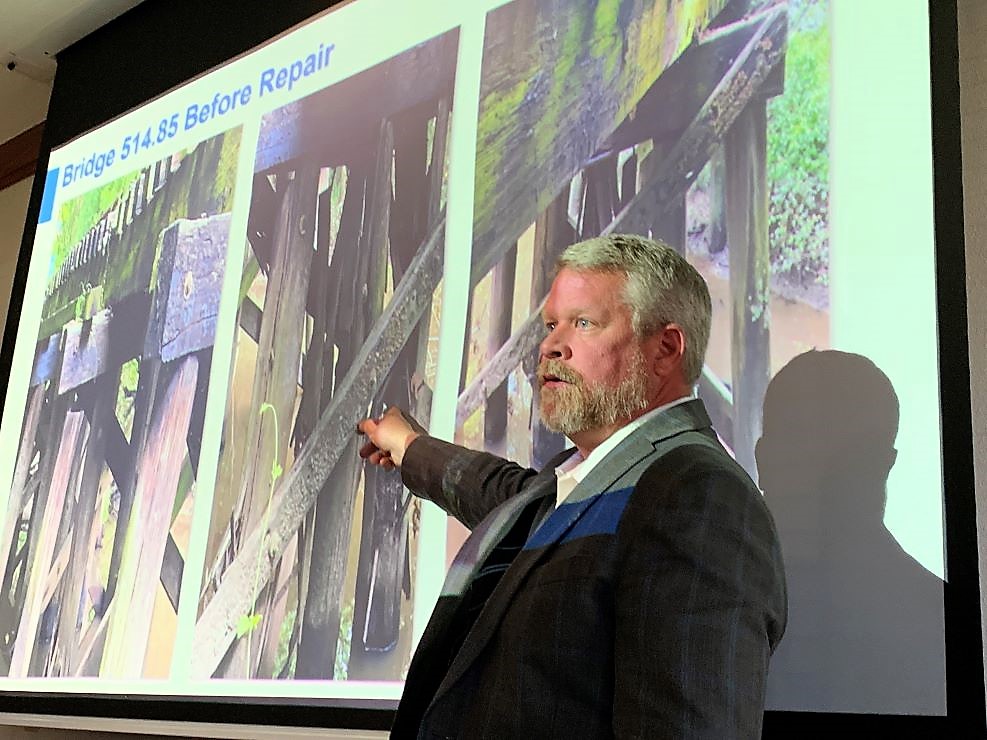
The decision follows two presentations by Mike Salek with Freedom Rail Group, which operator Northeast Texas Connector is a part of, and discussion by NETEX Board of Directors.
In April 2022, Salek presented information about the condition of the rail, costs the operator has incurred thus far making repairs to a tract that was in far better shape than either he or the NETEX Board knew when FRG/NETC contracted with NETEX to serve as rail operator. He showed photos of the rail and several budges before and after repairs and showed one video of a bridge that not only showed serious deterioration, moving and pulling apart in such as way each time a train crossed the track, the bridge appeared as if it might snap or completely separate at critical supports.
At the April 14 NETEX meeting, Salek noted that so far 2,450 ties and 2,760 new spikes have been installed, 24 tons of ballast spread, eight bridges have been repaired (averaging 2.5 week per bridge to repair).
Over the 21 months, NETC has gone $445,000 over contract in maintenance expenses. NETC spent $313,000 in 2020 for a partial year, $864,000 in 2021 and $241,000 from January through mid April of this year. That’s 58% of revenue going toward maintenance in 2020, 79% in 2021 and 72% in 2022. Overall, Salek reported, that’s 73%. NETC is obligated annually to spend 50% of the annual gross revenue on maintenance of hte portion of right-of-way that contains active track on the railroad right-of-way.
NETC, Salek reported in April, fronted $75,000 for cost of track repairs and upgrades for a new customer in Commerce. NETC, the customer and Commerce EDC teamed up to complete the project in a timely manner. A $500,000 excavator to clear overgrown brush from crossings. Eventually, all 65 miles of track will be cleared of debris which damages locomotives. Additional costs incurred include operator labor, liability and theft insurance and maintenance from wear and tear on equipment.
Salek reported $1.51 million received in income for the rail, plus $560 for costs of goods sold, for a total of $1.95 million gross profit. Expenses, however, totaled $3.7 million, about $1.8 million more than the business brought in from July 2020 through April 2022.
Salek said while there have been some derailments, so far no serious injury has been sustained but the track and cars have.
For instance, a noncritical derailment on the main in Weaver on April 26 took until May 4 to repair. The car did not overturn, but it did take the wheels out from under the car and caused damage under the front of it. Overall, the repair cost $17,000-$18,000 for that one minor derailment. Selak estimated 90% of derailments so far have been caused by floating rail.
NETC spent $313,149 on derailments, track repairs and inspections in 2022, another $863,922 last year and $240,852 as of April.
Car counts have increased 14% with repairs and additions of new or returning customers. The overall average monthly car count was 89 in 2020, and increased to 102 in 2021. An average of 6.8 customers per month were served in 2020, an average of 8.8 in 2021 and was up to 9.5 in January and February 2022.
NETC reported 127 carloads in April, 8 less than in March of 2022. However, the year-over-year car count has still increased from 110 in April 2021 to 127 in April 2022, Northeast Texas Connector Railroad Customer Service Representative Amanda Fernandez reported Thursday, May 5, 2022 to NETEX. There have been no additional ties installed nor bridges repaired since the April NETEX meeting.
In fact, the number of FRA 30-day defects identified over the last 2 years have declined considerably from 120 in December 2020 and 48 in January 2021, to two in March 2022.
On the other hand, there were no Federal Rail Administration 30-day defects that required repairing in the past 3 weeks either. NETC has overseen brush-cutting on FM 69 in Sulphur Springs and Weaver, Fernandez noted in the report of key performance indicators Thursday.
NETC was supposed to present a plan to get the railroad up to Class 2 standards. Salek noted they’ve been so busy attending catastrophic issues, such as repairing and remediating severe bridge deterioration and those caused by derailments, doing so is very difficult. The imminent issues have taken precedent to keep the rail running and making it safer for travel.
Being able to afford the floating track repairs and make identified bridge repairs would afford NETC the ability to write a budgeted maintenance plan, including projected costs.
Salek was asked in April to put together some figures for specific projects which NETEX Board could consider funding or at least helping to fund.
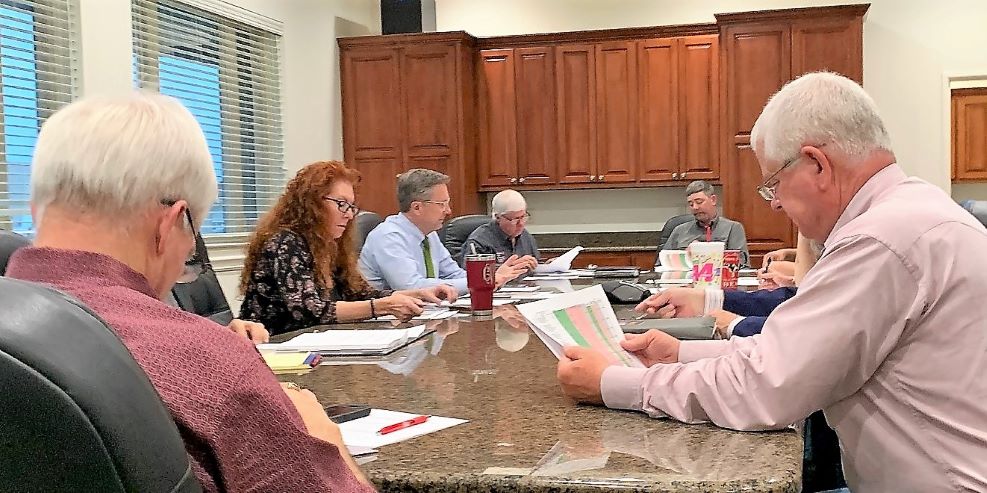
On May 5, NETC presented a sheet listing floating track defects that need to be addressed and another page with bridge repairs that are needed, each with estimates and a bridge rating level of 1-4. The NETC officials reported fortunately no bridges currently are rate a 1, which is considered to have catastrophic issues which would require operation to be shut down. There are about 2 dozen level 2 defects, which will require repair within the next 12 months. (For each level, 12 months would be added to the estimated time repair or remediation would be required.)
Overall costs to make identified repairs to address floating track issues are estimated at $200,000. Another $349,000 would help significantly with cost of repairs to bridges identified as being a level 2 maintenance priority.
The NETEX Board, after discussion Thursday, Salek was asked to attain at least 2 bids for the projects and committed up to $550,000 toward the repairs and work.
NETEX Board Vice President Cheryl Williams noted that with prices continuing to go up and materials taking even longer to attain from suppliers, it is her opinion NETEX cannot afford to not help. Waiting, current economics indicate, would likely cost even more – not only in inflation and potential delays in service but the cost of derailments too.
Salek is scheduled to present bid information for consideration of costs at the June NETEX Board meeting. The board recommended he oversee all of the work. The board will reimburse funds paid out.
NETEX plans to use $550,000 of the approximately $615,000 received in recent months for right-of-ways paid by Elavon development.
Brad Johnson and Steve McCullough gave an update on the Southwest Rail Conference 2022 which they recently attended. Also discussed were the 2022 Legislative session, contacts various Board members have made or suggested to contact and other potential resources available to help NETEX obtain state and/or federal grant funding for rail improvements. An option to hire a TxDOT lobbyist to assist, but that has been tabled barring additional research.
The board also teleconferenced with Jarret Mankin of RAMS Inc., the company NETEX hired due to the business’ experience with ROW matters, via teleconference call regarding a sewer easement the City of Commerce had requested and a request from a Commerce rail customer to tie into the NETEX line.
Plans are in the works for a presentation similar to the one Salek offered the NETEX Board in April. They hope to include some local elected officials and state legislators. The educational conference is tentatively set for mid-Juneat the Country Club.


